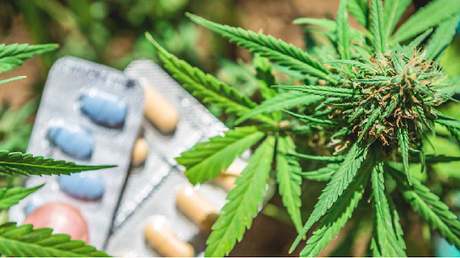 (Picture of opioid pills and marijuana plant is from healthline.com.)
(Picture of opioid pills and marijuana plant is from healthline.com.)The following is part of an article by Tom Angell at Forbes.com:
Letting people legally access marijuana appears to reduce reliance on addictive opioids, two new studies published by the American Medical Association find.
"Medical cannabis laws are associated with significant reductions in opioid prescribing in the Medicare Part D population," concludes one paper from researchers at the University of Georgia, Athens. "This finding was particularly strong in states that permit dispensaries, and for reductions in hydrocodone and morphine prescriptions."
The second study, from scientists at the University of Kentucky and Emory University, noted that "marijuana is one of the potential nonopioid alternatives that can relieve pain at a relatively lower risk of addiction and virtually no risk of overdose." It found that laws allowing medical cannabis or recreational marijuana "have the potential to lower opioid prescribing for Medicaid enrollees, a high-risk population for chronic pain, opioid use disorder, and opioid overdose.". . .
The two papers, released Monday by JAMA Internal Medicine, a publication of the AMA, looked at use of opioids such as fentanylby people enrolled in Medicare and Medicaid, with both examinations finding that states with legal marijuana access saw lower reliance on the pharmaceutical drugs.
And the easier the access to legal marijuana, the lower the rate of opioid prescribing.

